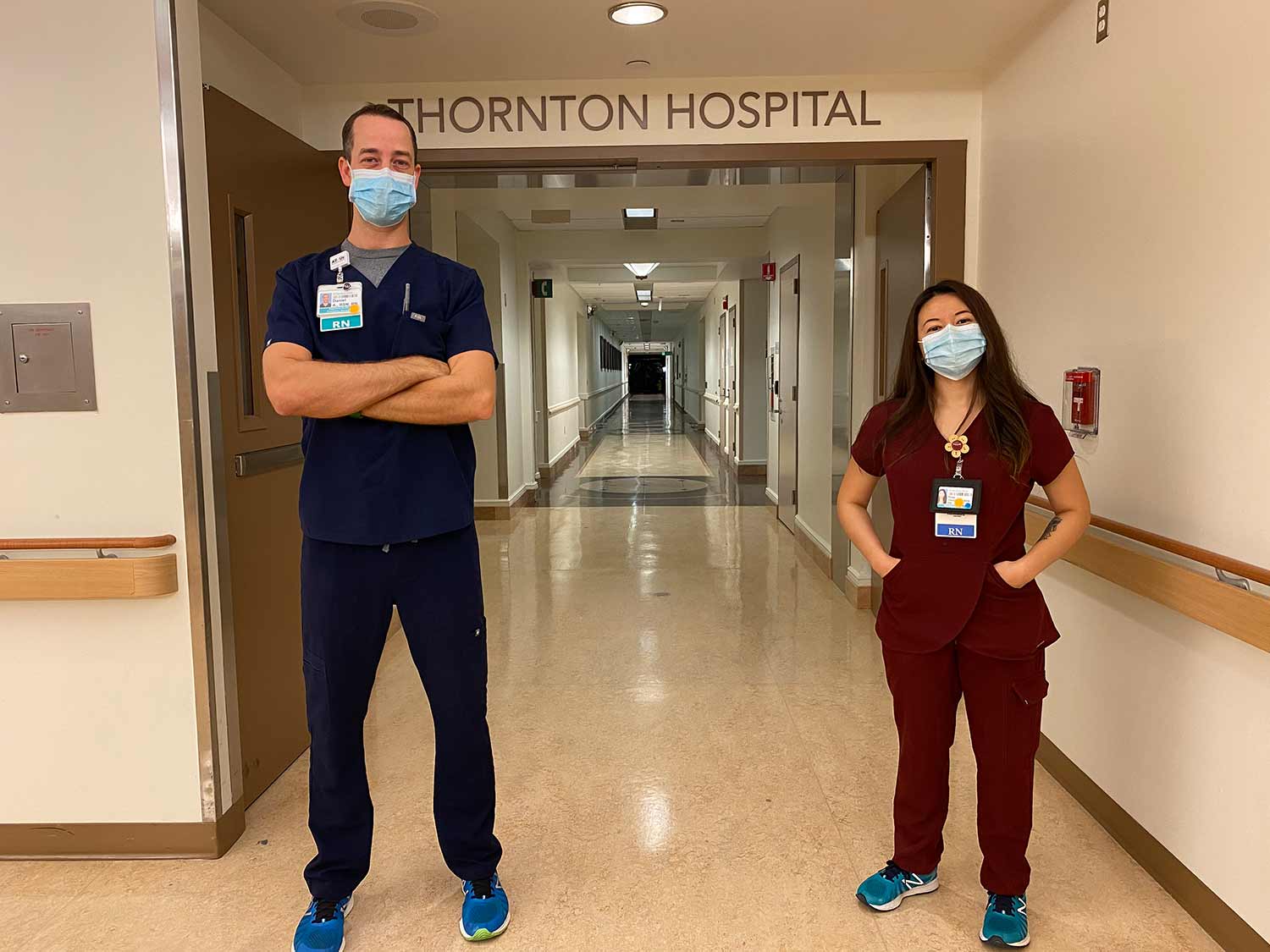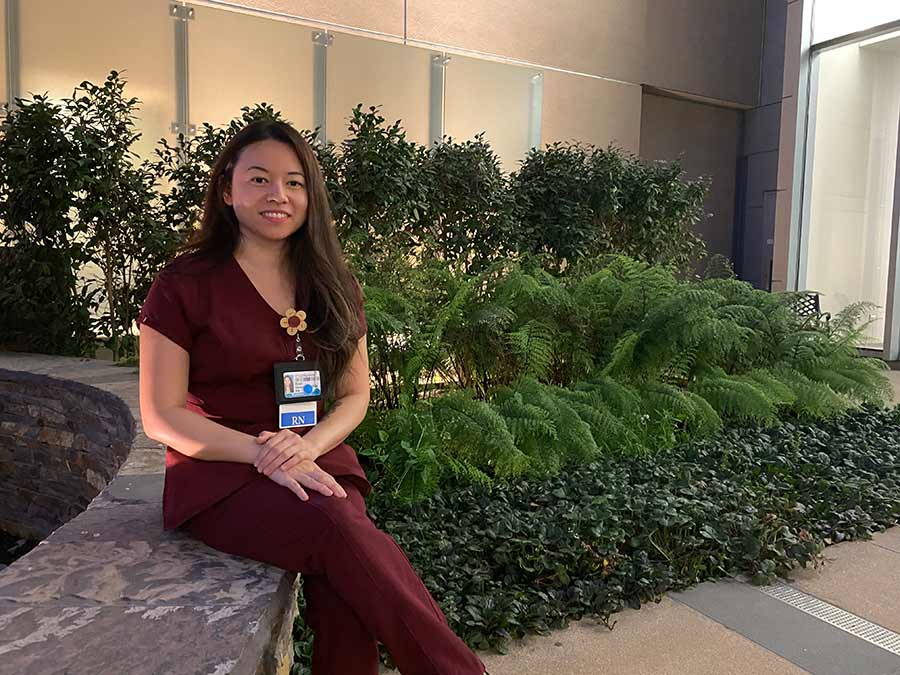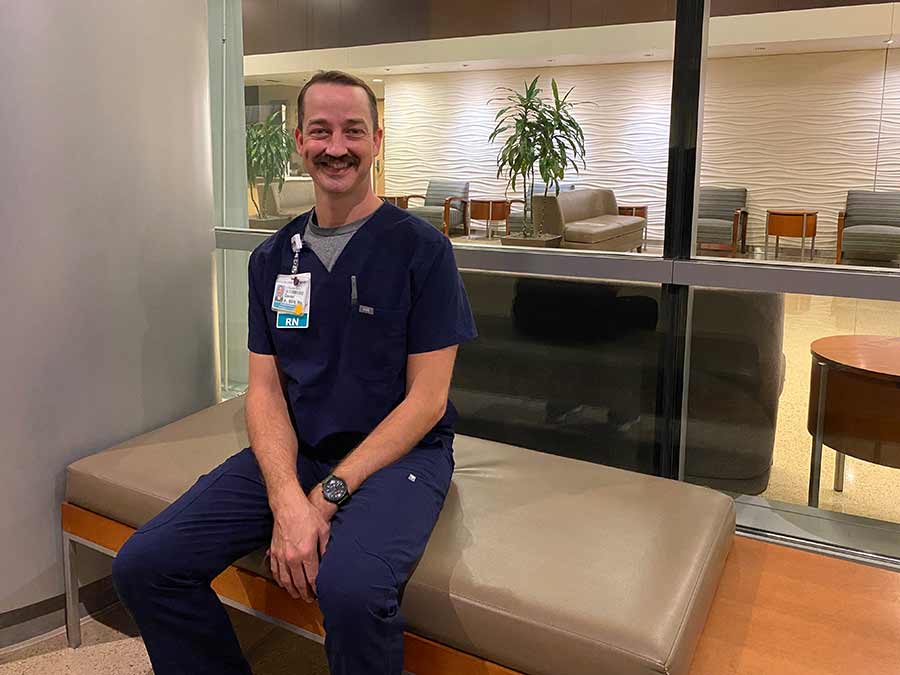By:
- Jeanna Vazquez
Published Date
By:
- Jeanna Vazquez
Share This:

Registered nurses Daniel Ambler and Rose Deocampo graduated from the New Graduate Nurse Transition to Practice Program during the COVID-19 pandemic.
Becoming a Nurse in the Era of COVID-19
When a nurse is asked why he or she chose to enter the profession, the common answer often revolves around the desire to make a difference. Nurses restore health and mend broken bones, welcome new life and provide support when life is lost. Now, they are on the frontlines of a pandemic.
These are challenging times for most nurses, but especially so for nurses at the beginning of their careers. Since 2008, UC San Diego Health has prioritized additional education for new nurses through a program that provides supported clinical learning, peer-to-peer engagement and an introduction to professional development resources. It’s called the New Graduate Nurse Transition to Practice Program.
Registered nurses Daniel Ambler and Rose Deocampo graduated from the program during the COVID-19 pandemic. We asked them how the training helped prepare them.
Q: What has it been like being a new registered nurse during the pandemic?
Ambler: It’s interesting because as a new grad this is all we know, and there isn’t a perfect process in trying to navigate this time. As a nurse in the emergency department, our work is especially challenging, but I know my team will always be there for me. Caring for patients with COVID-19 is a great responsibility. I had the opportunity to care for an elderly woman infected with the virus during her last moments of life. We were the ones there to hold her hand and offer her compassion and love. It is difficult sometimes to find balance in our nursing priorities, especially during this pandemic, but I believe in my team and I know the work we are doing matters.
Deocampo: The unit I am a part of, 2-East, was given the tremendous responsibility of caring for patients with COVID-19 beginning in March. I was grateful for my past experience as a certified nursing assistant (CNA) and licensed vocational nurse (LVN) because it helped build my confidence in taking care of patients with a virus that none of us have treated before. Now, we have guidelines in place, our precautions are working and we know we’ll get through this together. I was recently at the store in my scrubs after work and a stranger said ‘thank you’ to me, which was amazing. It’s a great time to be a nurse and I truly feel like I’m making a difference during such a historical moment in our lives.
Q: What’s one thing you wish people knew about COVID-19?

Rose Deocampo
Ambler: There’s a personal cost for health care providers to go and care for people at this time. I’m a single dad to two daughters whom my elderly parents help watch for me so I can go to work and provide for them. We’ve accepted this risk, but it’s disheartening to see others who do not have a full understanding of the issue, or aren’t willing to make certain personal sacrifices for the overall good of us all. At the end of the day, we’re all in this together.
Deocampo: We’re now entering flu season in the middle of a pandemic and it’s uncharted territory for us. Please be safe, wear a mask, wash your hands and socially distance. We have come so far to mitigate the spread of this virus, and as nurses we’re still facing it every day.
Q: How did the transition-to-practice program help you?
Deocampo: I appreciated the peer-to-peer support where we could talk with other nurses and learn about their experiences in different units. We all worried about the pandemic and bringing SARS-CoV-2 home to our loved ones, but the program gave us the opportunity to not only learn clinical concepts, but also gave us the opportunity to talk through our concerns while staying safe at home via virtual classes. Moreover, my preceptors and the rest of the 2-East team have been supportive of us throughout the program and even after we graduated that support continued. To work side-by-side with such excellent nurses in my unit, to see them in action and learn from them has been a highlight of my last 10 months as a new-grad RN.
Ambler: Nothing can prepare us for a pandemic, but having this program has made all the difference. It’s built into the culture here that it’s okay to ask questions and speak up when you need support, and that’s credit to our leaders at UC San Diego Health. I’m part of a work family that is committed to making a difference in people’s lives, and that’s the reason why I come back to work every single day, even during a pandemic. I’m so grateful for my team and I’m so grateful to be a nurse.
What is the New Graduate Nurse Transition to Practice Program?
The New Graduate Nurse Transition to Practice Program launched in 2008 and accredited with distinction by the American Nursing Credentialing Center (ANCC) in 2019.
Goals of the program include supporting new graduate nurses’ life-long learning and professional development, ensuring new graduate satisfaction, validating critical thinking and clinical decision-making skills, and keeping new graduate nurse turnover rate below the national benchmark.

Daniel Ambler
“We were the first program in San Diego to receive accreditation from the ANCC, demonstrating that our organization is elevating the practice of nursing by adhering to national standards of care,” said Heather Warlan, director of the New Graduate Transition to Practice Program at UC San Diego Health. “Our curriculum is driven by the best recommended practices for new grads transitioning to practice. Each new nurse at UC San Diego Health goes through this comprehensive education and training, which means all of our patients will receive the best care, in this specific case by well-trained nurses.”
The six-month program is held three times a year, with each cohort including approximately 25 new nurses. Over the course of the training, participants benefit from classroom and virtual synchronous learning, hands-on training and mentorship opportunities. Nurses are able to voice their experiences openly in a nonjudgmental environment that facilitates peer support, leadership guidance and opportunities to develop evidence-based best practices and responses for navigating future issues.
In response to the pandemic, leaders of the program have recently modified the curriculum to include self-care and mindfulness skills as a core element, in partnership with the UC San Diego Center for Mindfulness.
“The program is approached holistically and is led by a multidisciplinary team of leaders that value the vital need for care provided by accomplished and well-educated nurses,” said Linda Lobbestael, program lead in nursing education, development and research at UC San Diego Health. “The nurses we’re working with are amazing. They’re incredibly smart, highly motivated and resilient, with a desire to provide compassionate care for patients. Through my work with them, I believe in the future of our nursing workforce as we navigate these unprecedented times together.”
Share This:
You May Also Like
Stay in the Know
Keep up with all the latest from UC San Diego. Subscribe to the newsletter today.



